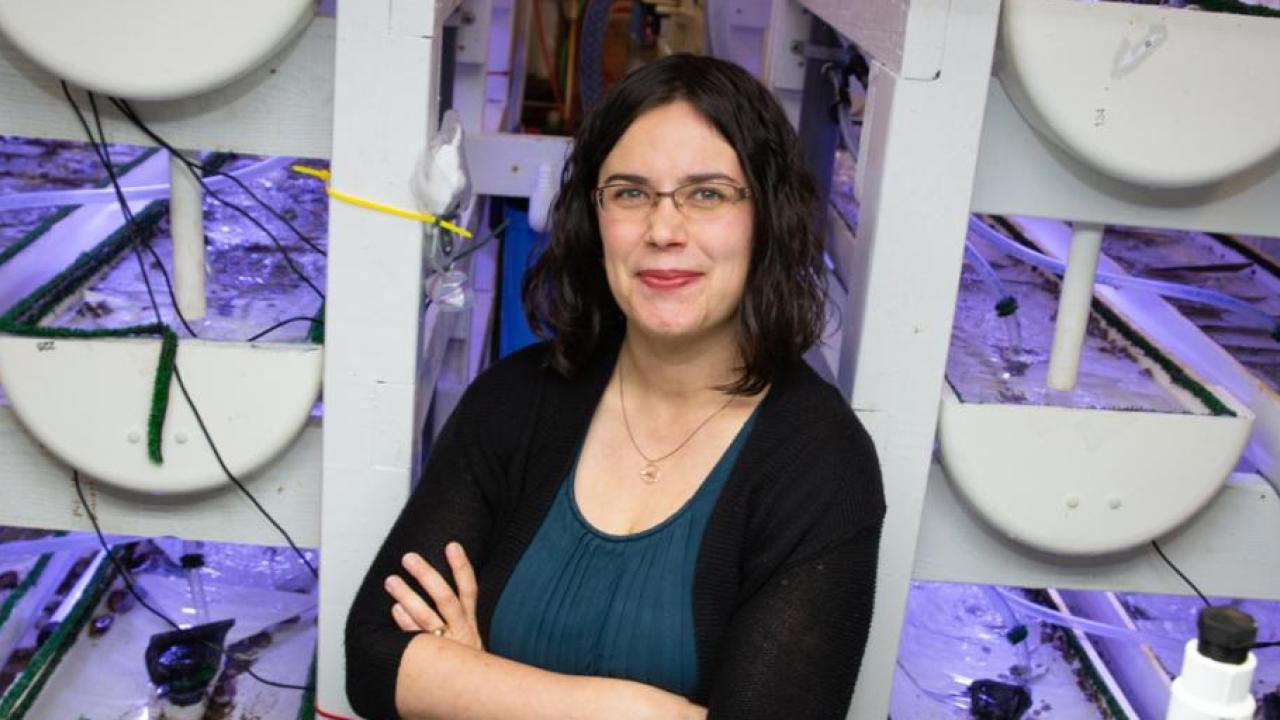
Alumna Kristin Aquilino On Quest to Save the White Abalone
About 375 million years ago, the state of Iowa lay submerged beneath an ocean. Marine creatures—like giant sea scorpions, snails and primitive fish—skittered, crawled and swam through these waters. Today, scientists and researchers have a close-up view of these prehistoric animals thanks to sites like the Devonian Fossil Gorge, which is located in Iowa City and was unveiled by a flood in 1993.
Kristin Aquilino, an assistant project scientist at the UC Davis Bodega Marine Laboratory, remembers that flood. She was a child when it occurred, and her father took her to a nearby spillway to watch hurtling waters cascade into the earth.
Though today Iowa is thousands of miles from both the Pacific and Atlantic oceans, the fossilized seafloor is a reminder of our constantly shifting Earth. And in a way, it was a sign of Aquilino’s future career as an ocean scientist.
Aquilino spent her upbringing in Iowa City exploring the woods that surrounded her home. She built paths, hunted for morel mushrooms and caught tadpoles in a nearby pond. The surroundings fed her interest in biodiversity, a subject area she later studied in more detail as an undergraduate at the University of Wisconsin-Madison.
“I was really interested in what happens when you add species to a system, like an invasion; or you subtract species from a system, like an extinction,” said Aquilino. “I was asking these really cool questions about that in agroecosystems, like in alfalfa fields, and I loved the questions I was asking.”
“I did not love the environment,” she added.
Following graduation, Aquilino decided a change of scenery was necessary. She heard about the work of UC Davis Professor Jay Stachowicz, Department of Evolution and Ecology. Stachowicz, it turned out, asked similar questions as Aquilino but investigated them using a different ecosystem, the ocean’s intertidal zones.
“They brought me out here, and I was like, ‘How could I not come to this place?’” recalled Aquilino, who graduated from UC Davis with a Ph.D. in Population Biology in 2011. “The Bodega Marine Lab and Reserve are so magical.”
Today, Aquilino is the director of the Bodega Marine Laboratory’s white abalone captive breeding program. She’s spent years investigating ways to help bring this species back from the brink of extinction. Last year, the National Oceanic and Atmospheric Administration honored Aquilino for her work with the Species in the Spotlight Recovery Hero Award.
“As a kid in Iowa, this was not something that I had in my purview at all,” said Aquilino. “Saving an endangered sea snail was just not there.”
Read the full story on the UC Davis College of Biological Sciences website.
About Graduate Studies at UC Davis
Graduate Studies at UC Davis includes over 100 dynamic degree programs and a diverse and interactive student body from around the world. Known for our state-of-the-art research facilities, productive laboratories and progressive spirit – UC Davis offers collaborative and interdisciplinary curricula through graduate groups and designated emphasis options, bringing students and faculty of different academic disciplines together to address real-world challenges.
UC Davis graduate students and postdoctoral scholars become leaders in their fields: researchers, teachers, politicians, mentors and entrepreneurs. They go on to guide, define and impact change within our global community.
